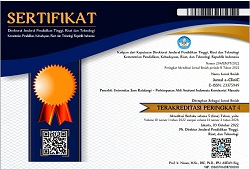Analisis Strategi Promosi Kesehatan dalam Meningkatkan Partisipasi Pria (Vasektomi) pada Program Keluarga Berencana di Provinsi Sulawesi Utara
DOI:
https://doi.org/10.35790/ecl.v11i1.44265Abstract
Abstract: The main problem of vasectomy implementation in family planning and reproductive health programs is the low participation. This study aimed to analyze health promotion strategies in increasing male participation (vasectomy) in the Family Planning Program in North Sulawesi Province. This was a qualitative study using in-depth interviews with 20 informants related to the family planning program, especially vasectomy. Informants consisted of stakeholders, religion and community leaders, and male family planning motivators and acceptors. The results showed that the health promotion strategy in terms of advocacy by policy makers was carried out in the form of budget support by the central and provincial governments, however, it still required support from local governments in the form of special policies or budget support and there were still obstacles in the form of limited providers who wanted to perform male family planning services in health facilities. Social support with an approach through religion and community leaders had been carried out in religion activities or meeting activities but had not yet been able to measure the success of the support. Male family planning motivators and acceptors played a role in increasing male participation (vasectomy) through the dissemination of correct information and testimonials. In conclusion, health promotion to increase male participation (vasectomy) in family planning programs in North Sulawesi Province requires strategies in the form of advocacy by policy makers (stakeholders), social support through religion and community leaders as well as community empowerment by male family planning motivators and acceptors done optimally.
Keywords: health promotion; family planning; male participant; vasectomy
Abstrak: Masalah utama yang dihadapi implementasi metode kontrasepsi vasektomi ialah rendahnya partisipasi pria dalam pelaksanaan program Keluarga Berencana (KB) dan kesehatan reproduksi. Penelitian ini bertujuan untuk menganalisis strategi promosi kesehatan dalam meningkatkan partisipasi pria melalui vasektomi pada Program KB di Provinsi Sulawesi Utara. Jenis penelitian ialah kualitatif melalui wawancara mendalam terhadap 20 informan yang berhubungan dengan program KB, khususnya vasektomi. Informan terdiri dari stakeholder, tokoh agama/tokoh masyarakat (Toga/Toma), motivator KB pria, dan akseptor KB pria. Hasil penelitian mendapatkan bahwa strategi promosi kesehatan dari segi advokasi oleh pihak penentu kebijakan dilakukan dalam bentuk dukungan anggaran oleh pemerintah pusat maupun provinsi, namun masih membutuhkan dukungan pemerintah daerah berupa kebijakan khusus ataupun dukungan anggaran, serta masih terdapat kendala berupa terbatasnya provider yang mau melakukan pelayanan KB pria di fasilitas kesehatan. Peningkatan kesertaan KB pria melalui dukungan sosial dengan pendekatan melalui toga/toma telah dilaksanakan pada kegiatan keagamaan atau kegiatan pertemuan namun belum bisa diukur capaian keberhasilan dari dukungan tersebut. Motivator KB pria dan akseptor KB pria telah berperan dalam meningkatkan partisipasi pria (vasektomi) melalui penyebaran informasi yang benar maupun testimoni. Simpulan penelitian ini ialah promosi kesehatan untuk meningkatkan partisipasi pria pada program KB vasektomi di Provinsi Sulawesi Utara membutuhkan strategi dalam bentuk advokasi oleh pemangku kebijakan (stakeholder), dukungan sosial melalui Toga/Toma serta pemberdayaan masyarakat oleh motivator KB pria maupun akseptor KB pria yang dilakukan secara optimal.
Kata kunci: promosi kesehatan; Keluarga Berencana; partisipasi pria; vasektomi
Downloads
Published
How to Cite
Issue
Section
License
COPYRIGHT
Authors who publish with this journal agree to the following terms:
Authors hold their copyright and grant this journal the privilege of first publication, with the work simultaneously licensed under a Creative Commons Attribution License that permits others to impart the work with an acknowledgment of the work's origin and initial publication by this journal.
Authors can enter into separate or additional contractual arrangements for the non-exclusive distribution of the journal's published version of the work (for example, post it to an institutional repository or publish it in a book), with an acknowledgment of its underlying publication in this journal.
Authors are permitted and encouraged to post their work online (for example, in institutional repositories or on their website) as it can lead to productive exchanges, as well as earlier and greater citation of the published work (See The Effect of Open Access).







